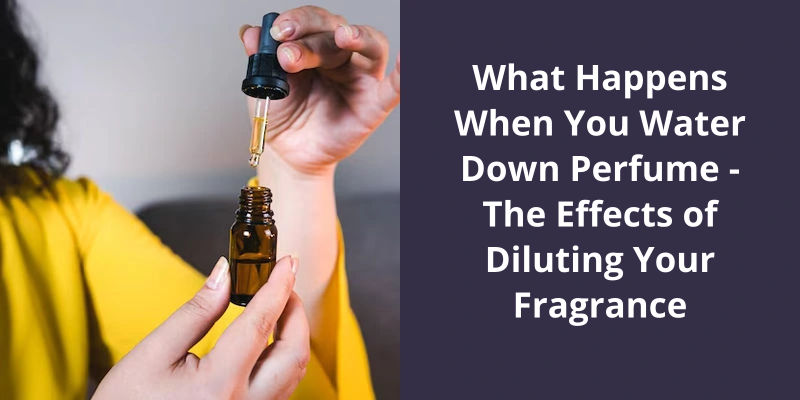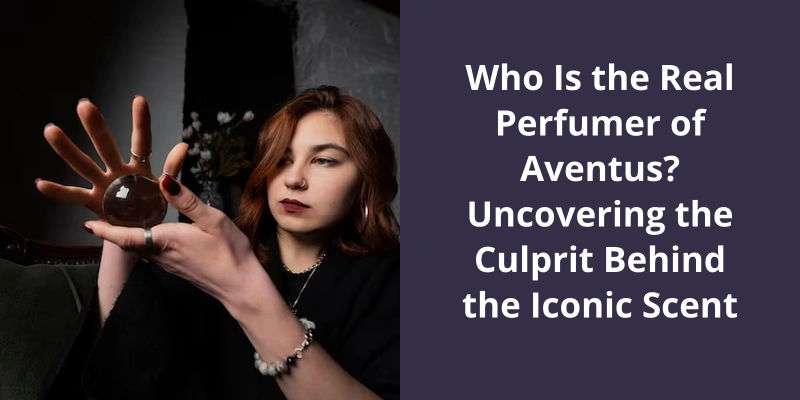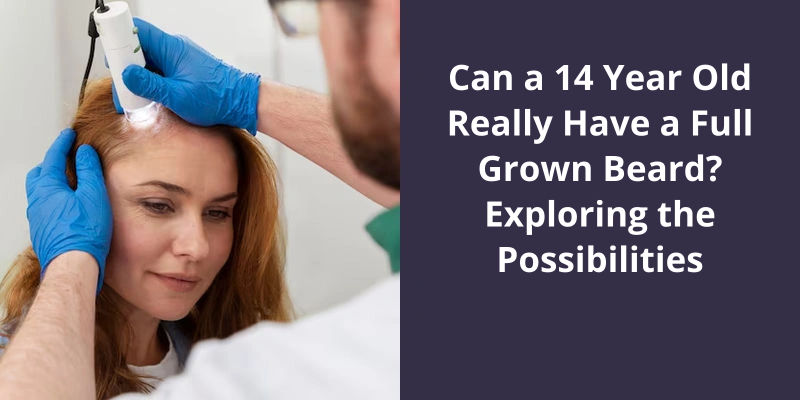When you water down perfume, it reduces its concentration, affecting its scent and longevity. The perfume’s aroma may not be as strong as before since water dilutes the essential oils, which are the primary source of the fragrance. Besides, the perfume might not last as long on your skin because water can lessen the impact of fixatives used to prolong the scent. This means you would need to reapply the fragrance more often. Moreover, water might promote bacteria growth as most perfumes contain alcohol that acts as a preservative, and diluting could lower this protective barrier. Therefore, it’s not advisable to water down your perfume.

Can You Use Water Instead of Alcohol in Perfume?
Additionally, water evaporates at a much slower rate than alcohol, meaning that the scent won’t diffuse as quickly or as effectively. This is one of the main reasons why alcohol is the preferred solvent for perfumes, as it allows for a consistent and even spread of the fragrance.
Another issue with using water instead of alcohol is that it can create a breeding ground for bacteria and other microorganisms. Alcohol is a natural disinfectant and prevents the growth of these harmful organisms. If water is used instead, the perfume may become contaminated and not only lose it’s scent, but also become harmful to use.
Furthermore, water can also alter the scent of the perfume itself. Perfumes often contain a complex blend of fragrant oils and compounds, and if these are mixed with water, the resulting scent may be drastically different than intended. This can result in a perfume that’s unrecognizable or even unpleasant.
In some cases, perfumes may contain a small amount of water in addition to alcohol, but this is typically done for specific purposes such as to adjust the evaporation rate or to enhance certain notes in the fragrance. However, this is done under very controlled circumstances and with specific intentions in mind, rather than simply substituting water for alcohol altogether.
Alternatives to Using Water or Alcohol as Solvents in Perfumes, Such as Oil-Based or Solid Perfumes
- Oil-based perfumes
- Solid perfumes
- Glycerin-based perfumes
- Ethanol-free perfumes
- Natural perfumes using essential oils and plant extracts
- Cream-based perfumes
- Candle-based perfumes
- Powder-based perfumes
- Scented body butters or oils
It’s important to properly apply perfume, as even a quick spritz can have damaging effects on clothing. Not only can it leave unpleasant stains, but the scent won’t last either. If you plan on wearing clothes that cover the pulse points where you apply fragrance, it’s best to let your perfume dry before getting dressed. But what about applying perfume to wet clothes? Let’s take a closer look.
Can I Put Perfume on Wet Clothes?
Many people love to smell great and use perfume to achieve this result. However, sometimes people wonder if it’s okay to put perfume on wet clothes. Wet clothes appear to be a risk factor, as they may get stains when sprayed. It may be tempting to do so if you’re in a rush, but the damage can be serious.
You might think that the scent of the perfume will stick to the clothes more if they’re wet, but that isn’t true. Instead, you’ll only end up having to change your clothes, and that isn’t something you’ll want to do often.
If you want to put perfume on your clothes, make sure you wait for them to dry first. This will save you a lot of hassle and effort. It would be best if you also thought about the location of the pulse points when you apply the perfume. If your clothes will cover the pulse points, it would be best to let the perfume dry before wearing them. Still, if you spray the perfume on your clothes, the benefits associated with it may not be evident.
If you follow these simple steps, you’ll enjoy the amazing scent of your perfume, and your clothes will stay clean and stain-free.
Types of Fabrics That Are Safe to Put Perfume on and Those That Are Not
- Cotton
- Linen
- Silk
- Wool
- Cashmere
- Polyester
- Nylon
- Rayon
- Acrylic
- Spandex
Source: Here’s How to Apply Perfume and Mistakes to Avoid
Now that we know it’s best to wait until our hair is completely dry before applying perfume, let’s delve into some other do’s and don’ts of hair perfume application.
Do You Put Perfume on Wet or Dry Hair?
Additionally, applying perfume to wet hair may result in the scent being altered due to the interaction between the fragrance and the water. This can lead to an unpleasant smell or a different scent altogether.
When applying perfume to dry hair, it’s recommended to spray the fragrance about 3-5 inches away from your hair and allow the mist to fall onto your tresses. This can help to evenly distribute the scent without overwhelming your hair. It’s also important to avoid spraying the perfume directly onto your scalp, as this can cause irritation and other scalp problems.
Before applying any fragrance to your hair, it’s important to check for any sensitivities or allergies to ingredients in the perfume. This can help to prevent irritation or discomfort during and after application. Additionally, it’s important to consider the type of fragrance you’re using, as heavy scents may be overpowering when applied to the hair. Consider opting for lighter scents or hair-specific fragrances that are designed to be gentle and long-lasting.
It’s also important to keep in mind that using hair perfume shouldn’t replace regular haircare routine. Proper cleansing and conditioning of your hair can help to ensure the health and cleanliness of your tresses. Additionally, using hair oils and other hair products can help to boost the scent of your hair perfume and prevent dryness or damage.
Taking proper care of your hair and finding the right hair perfume that works for you can help to ensure beautifully scented and healthy tresses.
How to Choose the Right Hair Perfume for Your Hair Type
- Consider your hair type and concerns before selecting a hair perfume.
- For fine hair, choose a light and fresh scent that won’t weigh your locks down.
- Curly and dry hair types will benefit from a hydrating and nourishing hair scent.
- For oily hair, opt for a refreshing and clarifying fragrance to help combat excess oil.
- Choose a scent that complements the perfume you currently wear on your skin to create a cohesive fragrance experience.
- Test the hair perfume on a small section of hair before applying it all over to avoid any potential allergic reactions.
- Consider the strength of the scent, as some hair perfumes can be overpowering and mask the natural scent of your hair.
- Look for hair perfumes with hair-friendly ingredients like argan oil, coconut oil, or keratin.
- Remember that hair perfumes aren’t meant to replace traditional hair care products like shampoo and conditioner.
- Have fun and experiment with different scents to find the perfect hair perfume for you!
Now that we’ve discussed the benefits of applying perfume immediately after showering, it’s important to consider whether doing so while still wet is a good idea. After all, the fear of diluting the fragrance or interfering with it’s staying power is a valid concern. So, let’s dive deeper into whether it’s safe to put on perfume when your skin is still damp.
Can You Put Perfume on While Wet?
Applying perfume after showering is a common practice among many women. It’s believed that the skins pores are open after a shower, allowing the scent to be absorbed more effectively. However, the question remains, can you put perfume on while wet? The answer is yes, but there are some things to keep in mind.
Firstly, it’s important to note that moisturizing the skin should be the first step before applying any perfume. Applying a perfume directly onto damp skin can lead to irritation or even an allergic reaction. Therefore, it’s crucial to let the skin dry off a bit first before applying any fragrance.
Doing so ensures that the scent is locked onto the skin, making it last longer. It’s recommended that you spray the perfume onto pulse points like the wrists, neck, and behind the ears to attain maximum effect.
It not only makes you smell good but also boosts your confidence and enhances your mood. But remember, a little goes a long way when it comes to perfume application, and it’s essential to use the right amount to avoid overdoing it.
With the right application technique and an appropriate amount of fragrance, you can leave a lasting impression everywhere you go.
How to Choose the Right Perfume for Your Skin Type and Personality
When it comes to choosing the right perfume, it’s important to take into account both your skin type and personality. Skin type can affect how a fragrance smells on you, so try out samples on your skin before making a purchase. Personality can also influence the type of scents you prefer. Consider if you prefer floral, woody, or spicy scents. Don’t rush the process and take your time choosing a fragrance that truly speaks to you.
So, does water reduce perfume smell? According to Glen Anderson, scrubbing with soap and water won’t do the trick. Instead, he suggests using alcohol to neutralize the scent. Keep reading to learn more about this perfume hack.
Does Water Reduce Perfume Smell?
But what about water? Does it have any effect on reducing perfume smell? Many people believe that washing their skin with water after applying perfume can help tone down the scent. This is because water is known to dilute chemicals and fragrances. However, the reality is that water can actually amplify the scent of perfume, making it stronger and more potent.
This is because water can open up the pores on our skin, allowing the fragrance molecules in the perfume to penetrate deeper and spread further. In fact, many perfume experts recommend avoiding water after applying fragrance, as it could alter the way the scent develops and interacts with your body chemistry.
Instead of using water, using a fragrance-free lotion or oil can help reduce the strength of the scent without affecting it’s quality or lasting power. Another option is to blot the skin with a clean cloth or towel to absorb any excess fragrance without altering it’s composition.
How to Properly Apply Perfume to Ensure Optimal Scent and Longevity
- Apply perfume after showering and moisturizing your skin.
- Hold the perfume bottle at a distance of about 6 inches from your skin.
- Don’t spray perfume directly onto your clothes.
- Apply perfume to your pulse points, such as your wrists, neck, and behind your ears.
- Avoid rubbing your skin after applying perfume as it can break down the scent.
- Reapply perfume throughout the day as needed, but don’t overdo it.
- Store your perfume in a cool, dry place away from sunlight and heat.
Now that you know the method for diluting pure perfume, it’s important to understand why it’s necessary and when it’s beneficial to do so. By diluting your fragrance oil, you can control the strength of the scent, making it more wearable for everyday use and extending the life of your perfume bottle. Additionally, dilution is a great way to create unique fragrance blends by combining different scents and adjusting the ratios to your liking. Read on for more tips and tricks for diluting and customizing your perfume collection.
How Do You Dilute Pure Perfume?
If youre an avid perfume lover, you might be interested in knowing how to dilute pure perfume. By diluting your fragrance oil, you can make it last longer and have a milder scent. Thankfully, diluting perfume is a relatively simple process that requires only a few basic steps.
To dilute your fragrance oil, you’ll need a carrier oil or non-scented lotion. Carrier oils like grapeseed oil, jojoba oil, and sweet almond oil are recommended choices. These oils are excellent options because they’re nourishing for the skin and have little to no scent, meaning they won’t interfere with the fragrance of your perfume.
To get started, you’ll need to add 1-2 drops of your pure perfume to a quarter-sized amount of your carrier oil or lotion. Blend the mixture between your hands to ensure the oil is evenly dispersed, and then apply it directly to your skin. Make sure to pass the scent mixture on your pulse points such as your wrist, throat, behind your ears, and elbows.
When diluting your perfume, it’s important to remember that a little goes a long way. If you add too much, you can always add more carrier oil or lotion to dilute the fragrance further. Additionally, if you prefer a stronger scent, you can always add more perfume to your mixture over time.
By using carrier oils or non-scented lotion, you can also nourish your skin while smelling amazing. With these easy steps, you can enjoy your perfume collection with peace of mind knowing that it will last longer and serve your best interest.
What Are the Benefits of Diluting Pure Perfume?
The benefits of diluting pure perfume include being able to control the intensity of the fragrance, making it last longer, and avoiding overwhelming reactions to strong scents. Dilution also makes it easier to apply the perfume evenly, and can help to stretch out the expensive cost of pure perfume by making it last longer.
Conclusion
In conclusion, watering down perfume may seem like a cost-effective solution to a quickly emptying bottle, but it does more harm than good. Additionally, chemically changing the composition of any perfume can put on user's skin, which can lead to skin irritation and other reactions.





